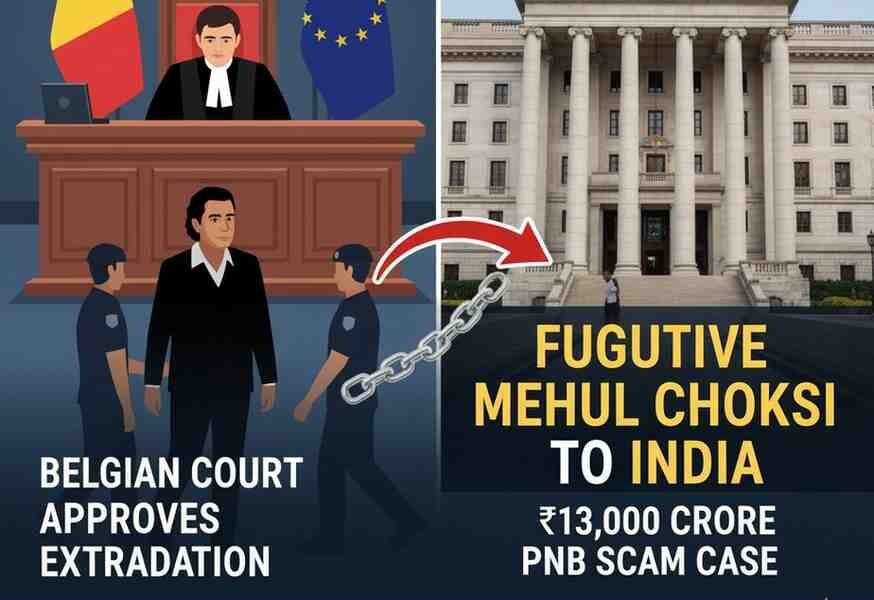A Belgian court has granted India’s request to extradite fugitive diamond trader Mehul Choksi, accused in the ₹13,000-crore Punjab National Bank fraud. Learn about the court’s decision, legal grounds, next steps, and its impact on India’s extradition efforts.
A Belgian court has officially approved the extradition of Mehul Choksi, the fugitive Indian businessman wanted for his alleged role in the ₹13,000-crore Punjab National Bank (PNB) fraud case. The ruling marks a major diplomatic and legal success for India, which has been pursuing Choksi’s return since 2018.
Background: The PNB Fraud and Choksi’s Flight
Mehul Choksi, along with his nephew Nirav Modi, is accused of orchestrating one of India’s largest bank frauds. According to investigators, Choksi’s company allegedly used fake Letters of Undertaking (LoUs) to obtain massive loans from PNB. After the scam came to light in early 2018, Choksi fled India and later acquired citizenship in Antigua and Barbuda, making India’s extradition efforts more complex.
In 2025, Choksi surfaced in Belgium, where he was detained by authorities based on India’s formal extradition request filed under the India-Belgium extradition treaty.
The Belgian Court’s Decision
The court in Antwerp has ruled in favor of India’s request, agreeing that the charges of fraud, criminal conspiracy, and money laundering meet the legal requirements for extradition under Belgian law. The court found India’s case credible and compliant with the “dual criminality” principle, which requires that the alleged offences be punishable in both countries.
India’s Assurances to Belgium
To address concerns regarding human rights and detention conditions, India provided a written assurance to the Belgian authorities. It promised that Mehul Choksi would be kept in a secure and humane environment at Mumbai’s Arthur Road Jail. The assurance detailed that he would receive proper medical treatment, ventilation, hygiene, and adequate personal space — meeting international prison standards.
These assurances were critical in convincing the Belgian court that Choksi’s extradition would not violate any humanitarian or legal norms.
Defense Arguments and Legal Challenges
Choksi’s legal team opposed the extradition, citing health issues, risk of unfair trial, and potential political motivation behind the case. His lawyers argued that his deteriorating health and the alleged “inhumane” conditions in Indian prisons made extradition unsafe.
However, the Belgian court dismissed these concerns, noting that India’s guarantees sufficiently protected his rights. Choksi is still expected to appeal the decision in a higher Belgian court before final surrender proceedings begin.
What Happens Next
If his appeal is rejected, Belgium will hand over Choksi to Indian authorities. Once extradited, he will face trial under multiple Indian laws — including the Prevention of Money Laundering Act (PMLA) and the Indian Penal Code (IPC) — for fraud, criminal conspiracy, and corruption.
The Central Bureau of Investigation (CBI) and Enforcement Directorate (ED) are likely to lead the prosecution once he returns.
Significance for India
The ruling is seen as a major win for India’s efforts to bring back fugitives accused of financial crimes. It demonstrates India’s growing success in building strong diplomatic and legal cases for extradition under international treaties.
If Choksi’s extradition goes through, it could set a strong precedent for other ongoing high-profile cases involving fugitives who fled abroad after major financial scandals.
The Belgian court’s decision to approve Mehul Choksi’s extradition is a landmark step in India’s pursuit of justice in the PNB fraud case. While the process may still face appeals, it signals growing global cooperation in tackling economic offences and cross-border financial crimes.

























